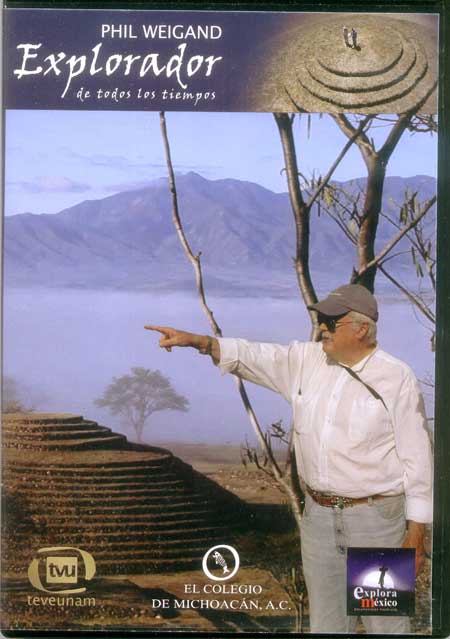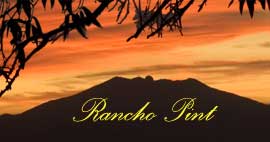|
By John Pint
 June
15, 2012 marked the first public screening of “Phil Weigand, an
Explorer for All Times” at Hospicio Cabañas in Guadalajara, Mexico. The
historical documentary was created by the team of Pascual Aldana,
Daniel Aldana and Alberto Fuentes of Explora México under the auspices
of El Colegio de Michoacán and TV UNAM. June
15, 2012 marked the first public screening of “Phil Weigand, an
Explorer for All Times” at Hospicio Cabañas in Guadalajara, Mexico. The
historical documentary was created by the team of Pascual Aldana,
Daniel Aldana and Alberto Fuentes of Explora México under the auspices
of El Colegio de Michoacán and TV UNAM.
The film focuses on the
life and discoveries of the late archaeologist
Phil Weigand (1937-2011) who, together with his wife Acelia García,
spent more than forty years unraveling some of the mysteries of a great
and hitherto unknown civilization which flourished in western Mexico
2000 years ago.
A fascinating 61-minute video on the life and work
of the late Phil Weigand is now available as a DVD, both in Spanish and
in English.
I went to the premier
showing of the film assuming I
already knew quite a bit about the subject, having counted Phil as a
friend for many years and having had a great interest in the ruins of
Teuchitlán ever since I climbed to the top of the Guachimontones back
in 1986, when they were covered with nettles and thorns and surrounded
by cornfields.
Well, I was quite wrong.
In the very spirit of the
great archaeologist himself, the filmmakers have unearthed fascinating
details about the man and his work which kept me and the rest of the
audience on the edge of our seats throughout the 61-minute video and
resulted in a great cheer at the end.
The opening lines of the film
are dramatic: “Even though by the 20th century the geography of our
planet was well known, there were still intrepid explorers and men of
science who traveled through distant, rugged lands to contribute
research that has deepened our understanding of mankind and complex
societies. One of those grand researchers was Phil Weigand …”
I then
learned that Weigand’s interest in archaeology dates back to his high
school years when he signed up as a “gopher” at an archaeological
excavation in his own state. “It was my own servicio social,” he says,
“six weeks among the mosquitoes and poison Ivy in southern Indiana.”
To
my surprise, I then learned that Phil Weigand, though an outstanding
student, never completed high school. “I almost graduated, but I got
bored and set out for adventure.” Off he went to Mexico: first to
Zacatecas and then to Jalisco, where he lived in the town of Chapala.
It was, in fact, in Chapala that he was introduced to Acelia García,
leading to their marriage in 1958.
Even more fascinating
for me was
a detailed description of the now famous discovery which led Weigand to
the Guachimontones. This took place in 1962 at the hot springs of El
Rincón where the Teuchitlán River is born. Says Acelia Weigand in the
movie: “The kids were diving near a huge fig tree in a small, natural
pool when I saw these shiny pieces of glass under the water. I told
them to be careful because there were broken bottles or something down
there and they could get cut. However, in those days there were no
restaurants or bars around there. So the kids started pulling these
shiny things out and they said, ‘No auntie, they’re not bottles,
they’re knives!’ Well, all of them were long, sharp, prismatic blades
of obsidian and I brought thirteen of them back to our house in
Etzatlán. Now at that time, Felipe was working in Durango, but when he
came back, I showed him these blades: ‘Look what I found,’ I said, but
I couldn’t get him to pay any attention to them for seven years. Seven
years it took for me to lead him up to the obsidian workshop from which
those blades had washed down to the swimming hole!” And all the rest is
history, as they say.
There are many other
revelations in the film,
including Weigand’s exploration of kilometers of pre-historic mines,
the discovery of a Persian qanat at least eight kilometers long in
Zapopan and the theme of his very last, not yet published book – on
Nazi anti-Semitism, of all things.
Only upon reaching home
with my
own copy of the DVD did I discover that it is both in Spanish and in
English, thanks to an excellent translation by Paul C. Kersey of the
Colegio de Michoacán. This documentary, as well as an equally
outstanding and bilingual DVD on Teuchitlán by the same team, are
available at the Teuchitlán Casa de Cultura, (65 meters west of the
plaza) for 120 pesos each or directly from the filmmakers in
Guadalajara (tel: 33-1086-4428, Pascual@exploramexicodocumentales.com)
or through Sandi Bookstore (http://www.sandibooks.com).
|

